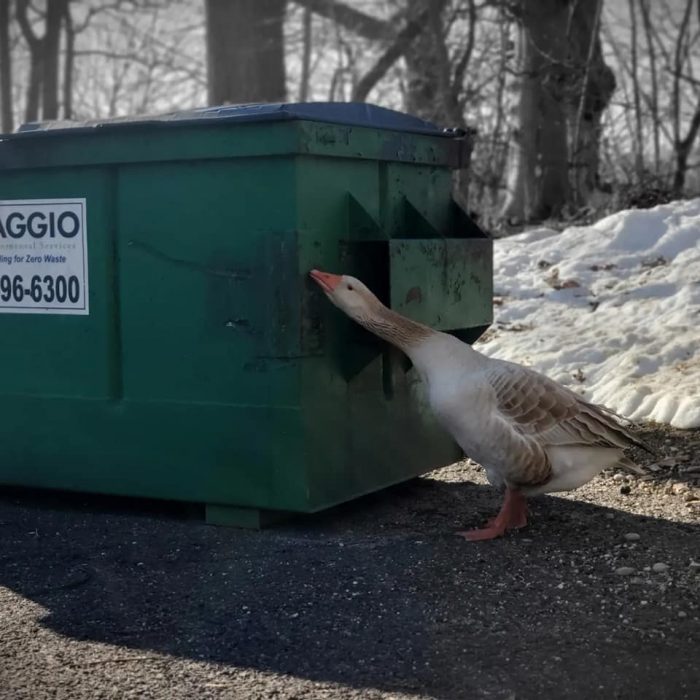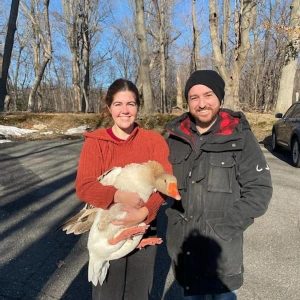Rescue center warns against buying geese, ducks

Earlier this year, when a Stony Brook nursery school teacher spotted a distressed goose outside of the school, being walking distance from Avalon Nature Preserve, it was thought the bird was injured.

Long Island Orchestrating for Nature, also known as LION, recently rescued what turned out to be a domesticated goose outside Mill Pond Nursery School in Stony Brook village. Every year on Long Island, the nonprofit rescues approximately 1,000 animals, around 600 of them being waterfowl.
John Di Leonardo, LION president and anthrozoologist, said the goose was found next to a dumpster outside the school and was crying for two days. Teachers tried to get her help, and when LION was notified, the animal rescuers arrived at the school to find the goose, hungry and scared, behind the dumpster. Di Leonardo said his wife, Juliana, was able to grab the waterfowl by hand. While the bird was frightened, he said it realized it needed help.
The anthrozoologist said they had rescued domesticated geese and ducks from Avalon in the past. As for the nursery school incident, he said somebody may have been bringing the goose to the pond and thought people saw them and abandoned the bird at the nursery school.
Di Leonardo said it’s common to find domesticated waterfowl abandoned in the wild. The birds have large bodies and small wings, and therefore they cannot fly to escape predators. The abnormalities are a result of being bred for the farming industry.
“Should these domestic ducks and geese breed with wild birds, their offspring will likely be flightless, exposing the young to the same dangers as their domestic parent,” he said.
Di Leonardo said the birds often starve to death in the wild because they don’t have the instincts to search for food, such as finding holes in icy waters.
The rescuer said they will be friendlier than their wild counterparts, begging people for food and sometimes pecking at a person’s legs.
“They’re not trying to be aggressive,” he said. “They’re just literally starving out there.”
He said often people buy geese and ducks online or in a store without realizing what is involved in caring for them. Di Leonardo said it’s not uncommon for people to buy the birds for Easter photo shoots and then let them loose. LION representatives have urged local stores not to stock them.
“Most people don’t realize what they’re getting into when they get these animals,” he said, adding some geese can live 30 years and ducks 10 to 12.
“People aren’t realizing that when they get them,” he said. “They’re cute and small, and they can outlive you in some cases.”
“Should these domestic ducks and geese breed with wild birds, their offspring will likely be flightless, exposing the young to the same dangers as their domestic parent.”
— John Di Leonardo
Di Leonardo said there was also an increase in people purchasing birds during the pandemic, especially chickens, since many were worried they wouldn’t find eggs in the stores. He said they didn’t realize that chickens don’t lay eggs for the first six months.
“We had a tremendous uptick in the number of animals abandoned since the pandemic started,” he said.
Di Leonardo said for those who own waterfowl, it’s essential to have an avian veterinarian. He added people need to watch for avian flu when it comes to domesticated waterfowl. The birds are more susceptible to it since they have weaker immune systems. He said it’s predominantly a commercial flock problem that can be transmitted to wild birds, and in rare cases, even humans. It can be difficult to tell if a waterfowl has the avian flu, he said, because they are largely asymptomatic. Chickens, however, would be dead in 24 hours, according to Di Leonardo.
He added the best practice is for those who already own birds to keep their flocks contained.
The rescuer said if people see a waterfowl in trouble or that looks out of place, they can call LION at 516-592-3722. A representative will come to check if it is a migrant bird or a creature that has been domesticated and needs help.






